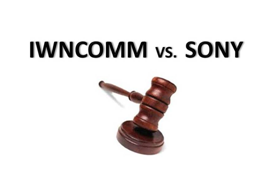Your Trustworthy IP Partner!
One Firm
Multiple Dimensions Services
You are here: Home > Information > Case < Back
A NOTEWORTHY SEP INFRINGEMENT DISPUTE: IWNCOMM VS. SONY
View: 2602 Date: 2017-03-23 10:22

With the developing of Chinese IP market, more and more SEP litigation campaigns were launched in recent years, and several legal issues produced by SEP related litigations have become hot topics in the field of intellectual property and anti-monopoly.
Considering special circumstances of SEP, Judicial Interpretation II by the Supreme People's Court on Some Issues Concerning the Application of Patent Infringement Disputes (JI (II) in short) has provided the legal foundation for some of the issues, such as the exception to injunction. According to Art. 24 of JI (II), the injunction may be not applicable to SEP in several conditions including the non-disclosure of SEP, the violation of FRAND by the patentee, and non-obvious fault made by the alleged infringer.
Based on JI (II), questions about whether the junction could be granted for SEP in China, and how to determine whether the FRAND principle was followed by the patentee and whether an obvious fault was made by the infringer were introduced. Moreover, other issues, such as the determination of the reasonable loyalty fee for the SEP portfolio, and the relationship between the loyalty fee and the damage which should be paid for one SEP of the SEP portfolio, are also remained.
At March 22, 2017, a civil judgment for a SEP related lawsuit, of which the Plaintiff is Xi'an XIDIANJIETONG Radio Network CO. (hereafter referred as IWNCOMM) and the Defendant is Sony Mobile Communications (China) Co., Ltd. (hereafter, referred as Sony Mobile), was issued by Beijing IP Court. This is an infringement lawsuit filed by IWNCOMM, which is the patentee of the SEP for a mandatory national standard (WAPI standard), against Sony Mobile in July 2, 2015. In the judgment, many critical issues regarding FRAND, injunction, loyalty fee, damage and so on were involved, which appears to be of instructive significance in SEP practice.
According to the judgment, Sony Mobile was ordered to halt manufacture and sale of 35 mobile devices, and paid the damage amounted to USD 1,254,185 (which is calculated as 3 times of the loyalty fee USD 0.1453/Phone * the amount of 35 mobile devices 2,876,391) and the reasonable cost amounted to USD 68,920. Such a judgment was made by the Court after fully considered two focuses of this case, i.e., whether or not the defendant has infringed the plaintiff's patent right, and if the infringement is established, how the defendant should bear civil liability.
The Summary of Judgment was shown here:
1. The court decided that the defendant had performed test for WAPI function on accused production of some models during research, which had been admitted by the defendant. Moreover, in the case that the court requested the test specification for implementing its WAPI function, but the defendant refused to submit the same, the court also reasonably concluded that the defendant follows the standard of “Quality Management System Requirements” during manufacture, testing or the like of the involved mobile phones, that is, the test for WAPI function was implemented.
2. In the current legal framework of China, the right exhaustion of process patent merely applies to the case of "products directly obtained according to the process patent”, that is, "manufacturing method patent". There is no problem of right exhaustion with respect to the “usage method patent”.
3. The composition factors of the patent infringement would not be changed as whether or not the involved patent is a SEP (Standard Essential Patent). That is to say, there is still the problem of patent infringement, even if a SEP is implemented without being licensed.
4. FRAND license statement is only the commitment of the patentee, and is the unilateral civil legal acts. Such commitment does not mean that it has issued a license, i.e., it cannot be concluded that the two parties have agreed on a patent licensing contract only based the involved FRAND license statement.
5. In general, indirect infringement behavior should has the premise of the existence of direct infringement behavior. However, this does not mean that the patentee should prove that another party has actually implemented a direct infringement behavior, but only need to prove that using the alleged infringing product in a manner preset in the product would fully cover the technical characteristics of the patent. Whether the user has to bear tort liability has nothing to do with the establishment of indirect infringement behavior.
6. In the case that both parties cannot agree with each other, faults made during the patent licensing negotiation between the two parties should be still considered in determining whether or not the right for the plaintiff to seek remedies to stop infringement should be absolutely excluded.
7. In the negotiation of SEP licensing, it is unnecessary to provide the CC, especially in the case that the patent implementing party can make an infringement assessment based on existing conditions.
Although the current judgment may not be the final one for this infringement case, it still has some significance in handling SEP related litigation, and also, a signal of strengthening the Chinese SEP protection was sent out to the world.
Leader Patent & Trademark Firm contributed reporting